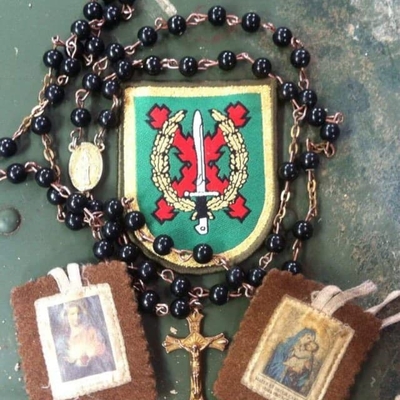While the Sinjar Resistance Units (commonly known by the Kurdish abbreviation of the YBŞ) appears to consist primarily of Iraqi Yezidis, there are also foreigners in the group's ranks, including Westerners. On the general level, I have covered the foreign contingent of the group embodied in the YBŞ International, as I conducted an interview with the YBŞ International's spokesman earlier this month. However, I also became interested in the contingent of Spaniards and Spanish-speaking members of the Sinjar Resistance Units, as I had heard some rumours about them from a journalist who has an interest in the Sinjar area. I determined that the best way to investigate these rumours was to conduct an interview with a Spaniard in the Sinjar Resistance Units. Thus, below is an interview I conducted today with a Spanish commander in the Sinjar Resistance Units regarding the Spaniards in the group. Any parenthetical insertions in square brackets are my own.

Q: When did the Spaniards join the Sinjar Resistance Units? Were the Spaniards members of the YPG before joining the Sinjar Resistance Units?
A: The first Spaniards who joined the YBŞ did so beginning from the month of November of 2016. They came from the YPG having passed through the academy of international members of that militia. With time and by will of the commanders of the YBŞ, foreign volunteers came directly to the YBŞ, receiving the same forming process as in the YPG (ideology, military instruction and other teachings).
Q: From which regions of Spain are the Spanish members of the units? Are there members who are of other Spanish-speaking countries? What is the number of Spaniards in the units?
A: The quantity of the Spaniards and of the other nationalities is variable. The commitment of remaining expires and the volunteers come and go. On occasions there are one or two and on other occasions they have been able to amount to half a dozen.
There have been people from different regions of Spain, from north to south and from east to west. There are candidates from Chile, Colombia, Argentina and Mexico, although so far Spanish-speaking brothers [i.e. of other countries besides Spain] have not arrived.
Q: In which battles did the Spaniards participate and what is the number of the martyrs?
A: We have participated in the liberation of the Sinjar region in Iraq, and also in the operations of Raqqa, Afrin, Deir az-Zor, Serekaniye [Ras al-Ayn] in Syria.
Two Spanish comrades have fallen in combat. The first Şehid Baran Galicia in Afrin under Turkish bombardments. And the second Şehid Kendal in an assault on a defensive position of ISIS [Islamic State] in Deir az-Zor. Other various Spaniards have been wounded in different ways in various operations.
Q: There are those who say that some Spanish members of the units are fascists or right-wingers in their ideology or their political background. What do you say in response to these rumours and can you clarify the political background of the Spanish members of the units and their ideology?
A: As the democratic militia that we are and under the ideology of Democratic Confederalism, we do not discriminate against anyone for their gender, religion, ethnicity, ideology or nationality. Any tolerant person who is also respectful with the comrades is welcome. Acquaintances with the ideology of the militia that should be respected are imparted. Any person who is dogmatic or intolerant in his behaviour, whether right or left, and of whatever profession, is going to clash with the spirit and form of the paradigm that we defend. Cliques, pigeon-holings, sectarianism or various sociopathies that are typical of the West are out of place here.
We do not judge or prejudge anyone for said person's ideas, which we do not otherwise ask about or care about, but rather for that person's behaviour. Intolerance or disrespect is more typical of persons than ideas.
Q: In general, how is the situation in Sinjar today? I mean in terms of return of the refugees and the displaced persons, the services etc.
A: The quantity of displaced Yezidis who live in the mountains has diminished. They are returning both to Sinjar city and to the other populated places. The normality is recovering although it continues to weigh the threats of the Turks and of their lackey KDP [Kurdistan Democratic Party] Peshmerga to occupy the zone. Our militia will continue guaranteeing the security of the population and will not leave again that labour in the hands of those who in 2014 fled as cowards, leaving a free way to the genocide that we could envision.
Q: Of course many Iraqi members of the units have joined the Hashd Sha'abi. But the foreigners are not going to join, correct?
A: As members of the YBŞ we form part of the units of popular protection of Iraq or the Hashd Sha'abi. We are one more militia of those forces under the name of Regiment 80. These popular forces guarantee the security and self-defence that the Iraqi army cannot guarantee. There are foreign interests in limiting the power of the Armed Forces of Iraq. Those same forces that were complicit in the growth of ISIS in Iraq and Syria. How can one rely again on those who have complicit by action or by omission in genocide number 74 of the Yezidi people?

